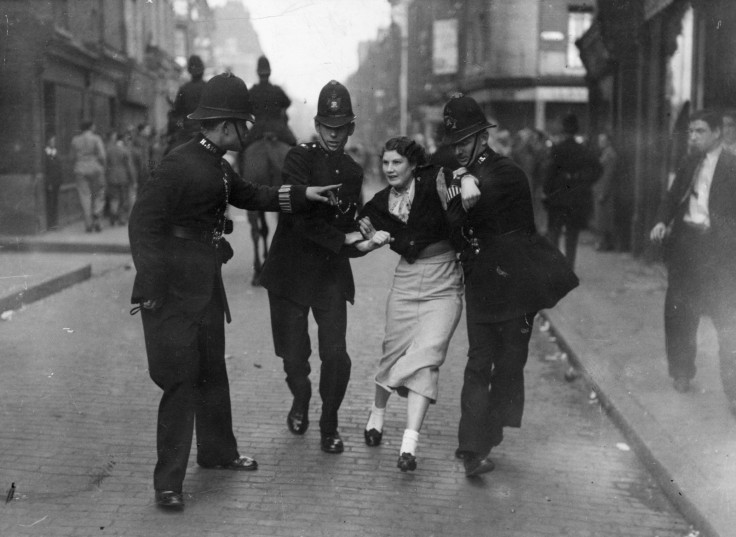Thousands march to honour 80th anniversary of the 'Battle of Cable Street'
Violence broke out between police, British Union of Fascists, Jewish, Irish and Communist groups in 1936.
A huge crowd took to London's East End on Sunday (9 October) to commemorate the 80th anniversary of the Battle of Cable Street.
The 1936 battle involved more than 20,000 anti-fascist demonstrators who clashed with Oswald Mosley's British Union of Fascists and officers from the Metropolitan Police Service who were protecting them.
Dozens of members from the Jewish and Irish communities are expected to be present – as was the case on the day of the clash.
One of the main organisers of the rally, David Rosenberg is also a member of the Jewish Socialists' Group and Jews for Jeremy.
Speaking to IBTimes UK, he said: "The Battle of Cable Street was one of the most important moments in the 1930s in Britain because if you look at Europe at that time, fascism was on the march everywhere and it was having a lot of successes everywhere.
"But here in London, it was turned back and in the struggle to turn it back, the Battle of Cable Street was a pivotal moment in that struggle.
"And it happened here in the East End of London and so since 1986, which was the 50th anniversary, every three or five years, there's been a commemoration.
"In the post-Brexit situation, we've had massive rises in racist attacks and we've had a whole range of communities being targeted.

"Racism in Britain is extremely versatile, so our message is honouring those who stood up to the anti-Semites in the 1930s. But our message is also for today in that we have to be fighting racism and fighting for a proper multicultural society where everyone is absolutely welcome as an equal member of that society."
The Jewish and Irish minority groups, who were prevalent in London's East End in the 1930s, were often targeted by fascists because they were migrant workers, drawing parallels with hate crimes today.
There were nearly 5,000 racially motivated offences in London between June 24 and September 30, compared with 3,620 in the 99 days before the Brexit vote, according to figures from the Mayor of London's office.

Austin Harney was at the anniversary rally representing the Irish community. He said: "I think, that as a community, it is extremely important for us to be here today because we played a pivotal role in the resistance on that day.
"The Battle of Cable Street resulted in a disastrous result for the fascists and is something that needs to be remembered more often."
Labour leader Jeremy Corbyn and the Rushanara Ali, MP for Bethnal Green & Bow, which includes Tower Hamlets, are due to speak at the event later in the day.
Mayor of London Sadiq Khan was invited to attend the march, but did not show up, drawing criticism from organisers. "Sadiq Khan was invited but he was the only one of 30 not to respond," Rosenberg said. "We had others who could not make it but sent us support for the event. Sadiq didn't even do that. We really feel this should be an event that the Mayor of London should be attending."
At the time of writing, the Mayor of London's official Twitter account did not make any mention of the event in Cable Street.
Solidarity with everyone taking part in Battle of Cable Street commemoration today. Remember all those who fought fascism & helped refugees.
— Durham Miners (@DurhamMiners) October 9, 2016
On the #CableStreet80 march through London's East End commemorating 80 years since a protest stopped fascists marching #uaf pic.twitter.com/PRG4VGJhxX
— Ken Olende (@kenolende) October 9, 2016
© Copyright IBTimes 2025. All rights reserved.




















